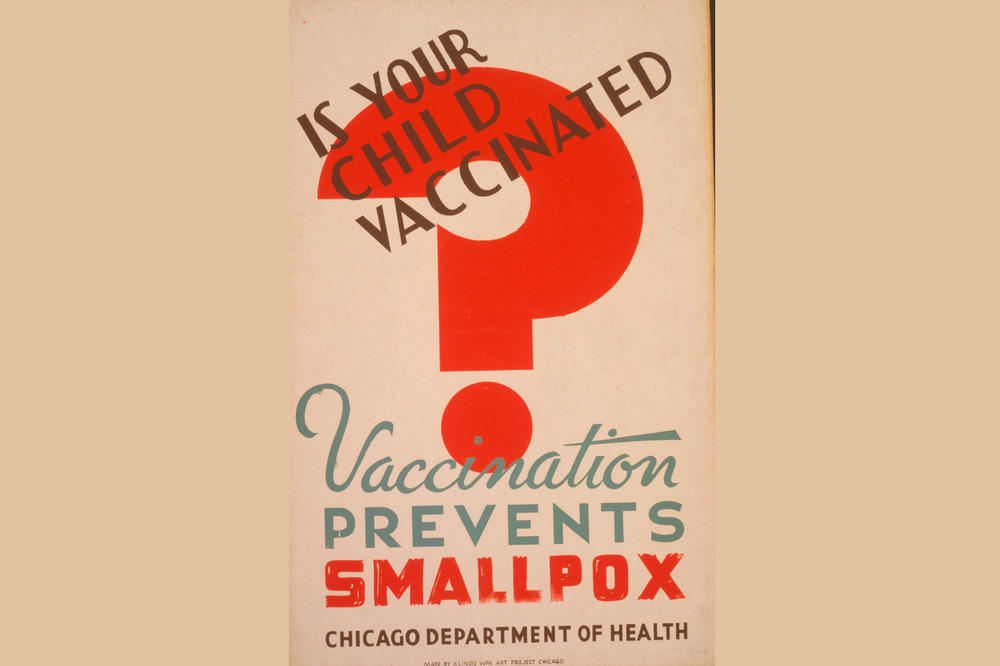An Udderly New Idea
A medical breakthrough 225 years ago brought the first vaccination against smallpox
May 25, 2021
An American poster campaign from the 1930s and 1940s urged parents to immunize their children against smallpox.
Image Credit: picture alliance / Photoshot
The coronavirus pandemic has triggered what is probably the largest, but above all the fastest, vaccination campaign in history. It promises a return to a life without the restrictions of the past months. Yet, not everyone shares this hope: Some people doubt the usefulness of the vaccines developed within a short period of time, and they even consider harmful effects to be possible or likely.
Looking back in history shows that vaccines brought about amazing successes in the fight against many pathogens. Their development is a medical revolution, stresses Professor Benedikt Kaufer, a virologist at Freie Universität Berlin. This year marks the 225th anniversary of one of these breakthroughs – the one that succeeded against the smallpox virus.
Milkmaids Who Contracted Cowpox Were Immune to Variola Smallpox
At the end of the 18th century, smallpox was still considered to be one of the most dangerous diseases for humans. That no one has to fear it today is due to an English country doctor – and cow udder pustules. Edward Jenner, 225 years ago, observed a characteristic rash on the hands of many milkmaids and realized that they had contracted cowpox. Otherwise they did not have any serious symptoms. At the same time, Jenner noticed that the milkmaids were becoming immune to a far more dangerous type of smallpox that could be transmitted from person to person. He came up with the groundbreaking idea of consciously infecting people with cowpox by applying infectious materials. He suspected that this would permanently protect them from the human variola smallpox. The word “vaccine” can be traced back to this discovery. It is derived from the Latin word for cow, vacca.
Successful Vaccination Convinced Many Doubters
According to historical sources, the first vaccination in history was administered by Edward Jenner to an English farm boy, James Phipps. The physician’s risky experiment proved to be successful. A few years passed, however, before the new, medically sensational method of vaccination was accepted and used widely. Virologist Benedikt Kaufer explains that many people were skeptical about the procedure because doctors could not explain how it worked. Modern knowledge about viruses, surface proteins, antibodies, and the human immune response was lacking. But the success of the treatment convinced many doubters, and compulsory smallpox vaccination did the rest. It was introduced in the Kingdom of Bavaria in 1807.
In 1980, almost 200 years after the first vaccination, the World Health Organization declared the smallpox virus to be eradicated. “International vaccination campaigns achieved one of the greatest victories in human history,” emphasizes Benedikt Kaufer, “the eradication of a deadly viral disease that was the cause of the death of many millions of people.” He adds, “Medical research has made tremendous progress since Edward Jenner’s first vaccination and has also advanced the development of novel vector, RNA, and DNA vaccines against other diseases.”
However, the development process with several clinical test phases that have to meet high standards is very tedious. It usually takes five to ten years for a drug to be approved, and the costs are correspondingly high. In addition, vaccine studies are not always crowned with success, for example, in the case of the human immunodeficiency virus (HIV), which usually causes AIDS. In theory, a vaccine or antiviral compounds can be found against all pathogens, explains Benedikt Kaufer. But many viruses and bacteria can change a lot over time, and this may reduce vaccination protection. (Kaufer notes that some positive developments on a new HIV vaccine were reported a few weeks ago.)
“Mutations of the corona virus SARS-COV-2 will keep us busy for a long time”
The immune system trained by the vaccine can no longer recognize the changed pathogens so quickly and easily. “It is very likely that mutations in the SARS-COV-2 coronavirus will keep us busy for a long time, despite the most intensive research efforts,” says the virologist. But distrust of scientific knowledge is also a serious problem worldwide. Lack of knowledge, widespread misinformation, and launched conspiracy theories can be reasons for skepticism about vaccinations.
Benedikt Kaufer emphasizes, “We are often not aware of the relatively worry-free world we live in. A multitude of dangerous diseases can no longer harm us.” Without vaccinations, many people would die sooner or suffer from the effects of infections for their entire lives. And it all started with Edward Jenner’s cowpox experiments.
This text originally appeared in German on April 24, 2021, in the Tagesspiegel newspaper supplement published by Freie Universität.
Further Information
Prof. Benedikt Kaufer, Ph.D., Lichtenberg Professor, Freie Universität Berlin, Department of Veterinary Medicine, Institute of Virology, Email: b.kaufer@fu-berlin.de

